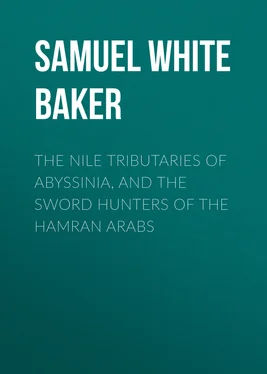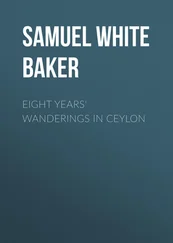Samuel White Baker - The Nile Tributaries of Abyssinia, and the Sword Hunters of the Hamran Arabs
Здесь есть возможность читать онлайн «Samuel White Baker - The Nile Tributaries of Abyssinia, and the Sword Hunters of the Hamran Arabs» — ознакомительный отрывок электронной книги совершенно бесплатно, а после прочтения отрывка купить полную версию. В некоторых случаях можно слушать аудио, скачать через торрент в формате fb2 и присутствует краткое содержание. Жанр: Путешествия и география, История, foreign_edu, foreign_antique, foreign_prose, на английском языке. Описание произведения, (предисловие) а так же отзывы посетителей доступны на портале библиотеки ЛибКат.
- Название:The Nile Tributaries of Abyssinia, and the Sword Hunters of the Hamran Arabs
- Автор:
- Жанр:
- Год:неизвестен
- ISBN:нет данных
- Рейтинг книги:3 / 5. Голосов: 1
-
Избранное:Добавить в избранное
- Отзывы:
-
Ваша оценка:
- 60
- 1
- 2
- 3
- 4
- 5
The Nile Tributaries of Abyssinia, and the Sword Hunters of the Hamran Arabs: краткое содержание, описание и аннотация
Предлагаем к чтению аннотацию, описание, краткое содержание или предисловие (зависит от того, что написал сам автор книги «The Nile Tributaries of Abyssinia, and the Sword Hunters of the Hamran Arabs»). Если вы не нашли необходимую информацию о книге — напишите в комментариях, мы постараемся отыскать её.
The Nile Tributaries of Abyssinia, and the Sword Hunters of the Hamran Arabs — читать онлайн ознакомительный отрывок
Ниже представлен текст книги, разбитый по страницам. Система сохранения места последней прочитанной страницы, позволяет с удобством читать онлайн бесплатно книгу «The Nile Tributaries of Abyssinia, and the Sword Hunters of the Hamran Arabs», без необходимости каждый раз заново искать на чём Вы остановились. Поставьте закладку, и сможете в любой момент перейти на страницу, на которой закончили чтение.
Интервал:
Закладка:
The effect of these desert whirlwinds is most curious, as their force is sufficient to raise dense columns of sand and dust several thousand feet high; these are not the evanescent creations of a changing wind, but they frequently exist for many hours, and travel forward, or more usually in circles, resembling in the distance solid pillars of sand. The Arab superstition invests these appearances with the supernatural, and the mysterious sand-column of the desert wandering in its burning solitude, is an evil spirit, a "Gin" ("genii" plural, of the Arabian Nights). I have frequently seen many such columns at the same time in the boundless desert, all travelling or waltzing in various directions at the wilful choice of each whirlwind: this vagrancy of character is an undoubted proof to the Arab mind of their independent and diabolical origin.
The Abyssinian traveller, Bruce, appears to have entertained a peculiar dread of the dangers of such sand columns, but on this point his fear was exaggerated. Cases may have occurred where caravans have been suffocated by whirlwinds of sand, but these are rare exceptions, and the usual effects of the dust storm are the unroofing of thatched huts, the destruction of a few date palms, and the disagreeable amount of sand that not only half chokes both man and beast, but buries all objects that may be lying on the ground some inches deep in dust.
The wind at this season (June) was changeable, and strong blasts from the south were the harbingers of the approaching rainy season. We had no time to lose, and we accordingly arranged to start. I discharged my dirty cook, and engaged a man who was brought by a coffee-house keeper, by whom he was highly recommended; but, as a precaution against deception, I led him before the Mudir, or Governor, to be registered before our departure. To my astonishment, and to his infinite disgust, he was immediately recognised as an old offender, who had formerly been imprisoned for theft! The Governor, to prove his friendship, and his interest in my welfare, immediately sent the police to capture the coffee-house keeper who had recommended the cook. No sooner was the unlucky surety brought to the Divan than he was condemned to receive 200 lashes for having given a false character. The sentence was literally carried out, in spite of my remonstrance, and the police were ordered to make the case public to prevent a recurrence. The Governor assured me, that as I held a firman from the Viceroy he could not do otherwise, and that I must believe him to be my truest friend. "Save me from my friends," was an adage quickly proved. I could not procure a cook, neither any other attendants, as every one was afraid to guarantee a character, lest he might come in for his share of the 200 lashes!
The Governor came to my rescue, and sent immediately the promised Turkish soldiers, who were to act in the double capacity of escort and servants. They were men of totally opposite characters. Hadji Achmet was a hardy, powerful, dare-devil-looking Turk, while Hadji Velli was the perfection of politeness, and as gentle as a lamb. My new allies procured me three donkeys in addition to the necessary baggage camels, and we started from the pleasant garden of Halleem Effendi on the evening of the 10th of June for the junction of the Atbara river with the Nile.
CHAPTER II
"'Mongst them were several Englishmen of pith,
Sixteen named Thompson, and nineteen named Smith."
MAHOMET, Achmet, and Ali are equivalent to Smith, Brown, and Thompson. Accordingly, of my few attendants, my dragoman was Mahomet, and my principal guide was Achmet; and subsequently I had a number of Alis. Mahomet was a regular Cairo dragoman, a native of Dongola, almost black, but exceedingly tenacious regarding his shade of colour, which he declared to be light brown. He spoke very bad English, was excessively conceited, and irascible to a degree. No pasha was so bumptious or overbearing to his inferiors, but to me and to his mistress while in Cairo he had the gentleness of the dove, and I had engaged him at 5l. per month to accompany me to the White Nile. Men change with circumstances; climate affects the health and temper; the sleek and well-fed dog is amiable, but he would be vicious when thin and hungry; the man in luxury and the man in need are not equally angelic. Now Mahomet was one of those dragomen who are accustomed to the civilized expeditions of the British tourist to the first or second cataract, in a Nile boat replete with conveniences and luxuries, upon which the dragoman is monarch supreme, a whale among the minnows, who rules the vessel, purchases daily a host of unnecessary supplies, upon which he clears his profit, until he returns to Cairo with his pockets filled sufficiently to support him until the following Nile season. The short three months' harvest, from November until February, fills his granary for the year. Under such circumstances the temper should be angelic. But times had changed: the luxurious Mahomet had left the comfortable Nile boat at Korosko, and he had crossed the burning desert upon a jolting camel; he had left the well-known route where the dragoman was supreme, and he found himself among people who treated him in the light of a common servant. "A change came o'er the spirit of his dream;" Mahomet was no longer a great man, and his temper changed with circumstances; in fact, Mahomet became unbearable, and still he was absolutely necessary, as he was the tongue of the expedition until we should accomplish Arabic. To him the very idea of exploration was an absurdity; he had never believed in it from the first, and he now became impressed with the fact that he was positively committed to an undertaking that would end most likely in his death, if not in terrible difficulties; he determined, under the circumstances, to make himself as disagreeable as possible to all parties. With this amiable resolution Mahomet adopted a physical infirmity in the shape of deafness; in reality, no one was more acute in hearing, but as there are no bells where there are no houses, he of course could not answer such a summons, and he was compelled to attend to the call of his own name—"Mahomet! Mahomet!" No reply, although the individual was sitting within a few feet, apparently absorbed in the contemplation of his own boots. "Mahomet!" with an additional emphasis upon the second syllable. Again no response. "Mahomet, you rascal, why don't you answer?" This energetic address would effect a change in his position; the mild and lamb-like dragoman of Cairo would suddenly start from the ground, tear his own hair from his head in handfuls, and shout, "Mahomet! Mahomet! Mahomet! always Mahomet! D—n Mahomet! I wish he were dead, or back in Cairo, this brute Mahomet!" The irascible dragoman would then beat his own head unmercifully with his fists, in a paroxysm of rage.
To comfort him I could only exclaim, "Well done, Mahomet! thrash him; pommel him well; punch his head; you know him best; he deserves it; don't spare him!" This advice, acting upon the natural perversity of his disposition, generally soothed him, and he ceased punching his head. This man was entirely out of his place, if not out of his mind, at certain moments, and having upon one occasion smashed a basin by throwing it in the face of the cook, and upon another occasion narrowly escaped homicide, by throwing an axe at a man's head, which missed by an inch, he became a notorious character in the little expedition.
We left Berber in the evening at sunset; we were mounted upon donkeys, while our Turkish attendants rode upon excellent dromedaries that belonged to their regiment of irregular cavalry. As usual, when ready to start, Mahomet was the last; he had piled a huge mass of bags and various luggage upon his donkey, that almost obscured the animal, and he sat mounted upon this pinnacle dressed in gorgeous clothes, with a brace of handsome pistols in his belt, and his gun slung across his shoulders. Upon my remonstrating with him upon the cruelty of thus overloading the donkey, he flew into a fit of rage, and dismounting immediately, he drew his pistols from his belt and dashed them upon the ground; his gun shared the same fate, and heaving his weapons upon the sand, he sullenly walked behind his donkey, which he drove forward with the caravan.
Читать дальшеИнтервал:
Закладка:
Похожие книги на «The Nile Tributaries of Abyssinia, and the Sword Hunters of the Hamran Arabs»
Представляем Вашему вниманию похожие книги на «The Nile Tributaries of Abyssinia, and the Sword Hunters of the Hamran Arabs» списком для выбора. Мы отобрали схожую по названию и смыслу литературу в надежде предоставить читателям больше вариантов отыскать новые, интересные, ещё непрочитанные произведения.
Обсуждение, отзывы о книге «The Nile Tributaries of Abyssinia, and the Sword Hunters of the Hamran Arabs» и просто собственные мнения читателей. Оставьте ваши комментарии, напишите, что Вы думаете о произведении, его смысле или главных героях. Укажите что конкретно понравилось, а что нет, и почему Вы так считаете.












